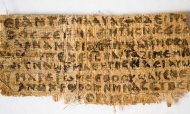Just came out Yahoo news reporting that more American researchers have investigated the papyrus fragment where Jesus says 'my wife'. They found it not a fake. The news is fully reproduced below the text in portuguese.
---------------
Está bem, bem pequenino, difícil de notar, o título no site de notícias do Yahoo britânico.
Acabou de ir ao ar - há duas horas e 20 minutos.
Em 2012, uma historiadora da Harvard University apresentou ao mundo, corajosamente, um fragmento de papiro que ela denominou de "Evangelho da Mulher de Jesus", traduzindo-se para o português. A denominação original é em inglês: GJW - Gospel of Jesus' Wife. Isso não era mera provocação à Igreja Católica. O fragmento contém parte de um texto, e nessa parte Jesus se refere à "minha mulher".
Com ou sem tal nome, o papiro irritou o Vaticano e, pouco tempo depois do anúncio, Helen L King, a astuta pesquisadora, voltou atrás em suas declarações e sumiu.
Mas, descobrimos agora, ela não se enfiou numa toca ou caverna. Esteve, desde então, buscando a contribuição de outros pesquisadores para, antes de mais, determinar se o fragmento era uma falsificação ou se era legítimo.
E eis que o título no Yahoo recém publicado dá-nos a resposta: é legítimo. A Igreja Católica agora não tem na mira apenas Helen, mas diversos outros pesquisadores de renomadas universidades norte-americanas: Columbia, MIT, além de Harvard.
Conheci diversos católicos que ficam abertamente indignados com alusões a mulheres de Jesus. Tal grupo intolerante inclui mulheres que, estranhamente para mim, julgam o relacionamento homem-mulher pecaminoso. Para elas, portanto, o "santo Jesus" não "encostou" em mulher alguma, jamais.
Uma boa pergunta é: teria o grupo de pesquisadores se animado a retomar a questão graças ao comportamento sensato que o Papa Francisco vem encenando ao mundo?
REPRODUÇÃO
https://uk.news.yahoo.com/jesus-wife-papyrus-fragment-not-fake-164307787.html#Qoi3Q4T
A faded papyrus fragment, known as the "Gospel of Jesus' Wife" which the Vatican declares a fake, is most likely an ancient document and not a modern forgery, scientists say.
The tiny piece measuring 8cm by 4cm has been controversial because it contained the passage "Jesus said to them, 'My wife..." - a phrase never seen before in any scripture.On the fragment, which emerged in 2012 , there were also the words: "She will be able to be my disciple".
Never before has a gospel referred to Jesus having women as disciples and this caused a stir amid the debate in some churches over whether women should be allowed to be priests.
The fragment has been analysed by experts at Columbia University, Harvard University and the Massachusetts Institute of Technology.
And they concluded after carbon testing that the papyrus and ink used dated from between the sixth and ninth centuries.
The test results do not prove Jesus had a wife or disciples who were women.
But the fragment is likely to be part of an ancient manuscript rather than a fake, claim scientists.
They say it "belongs to early Christian debates over whether it was better for Christians to be celibate virgins or to marry and have children".
Also the piece is too small to know anything definite about who may have composed, read or circulated it, except that they were Christians.
Historian Karen L King from Harvard Divinity School gave the papyrus its name and said in a recent interview: "I took very seriously the comments of such a wide range of people that it might be a forgery.
"When you have all the evidence pointing in one direction, it doesn't make it 100%, but history is not a place where 100% is a common thing."

